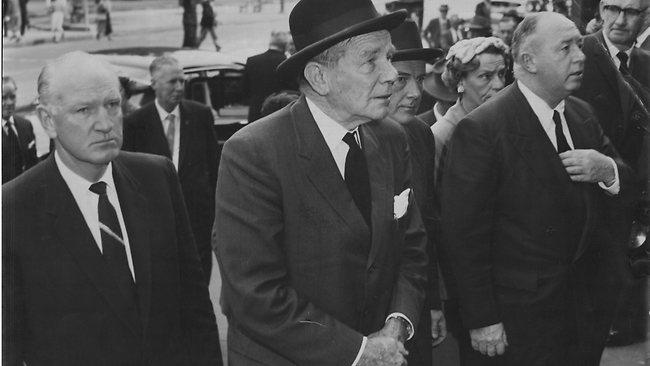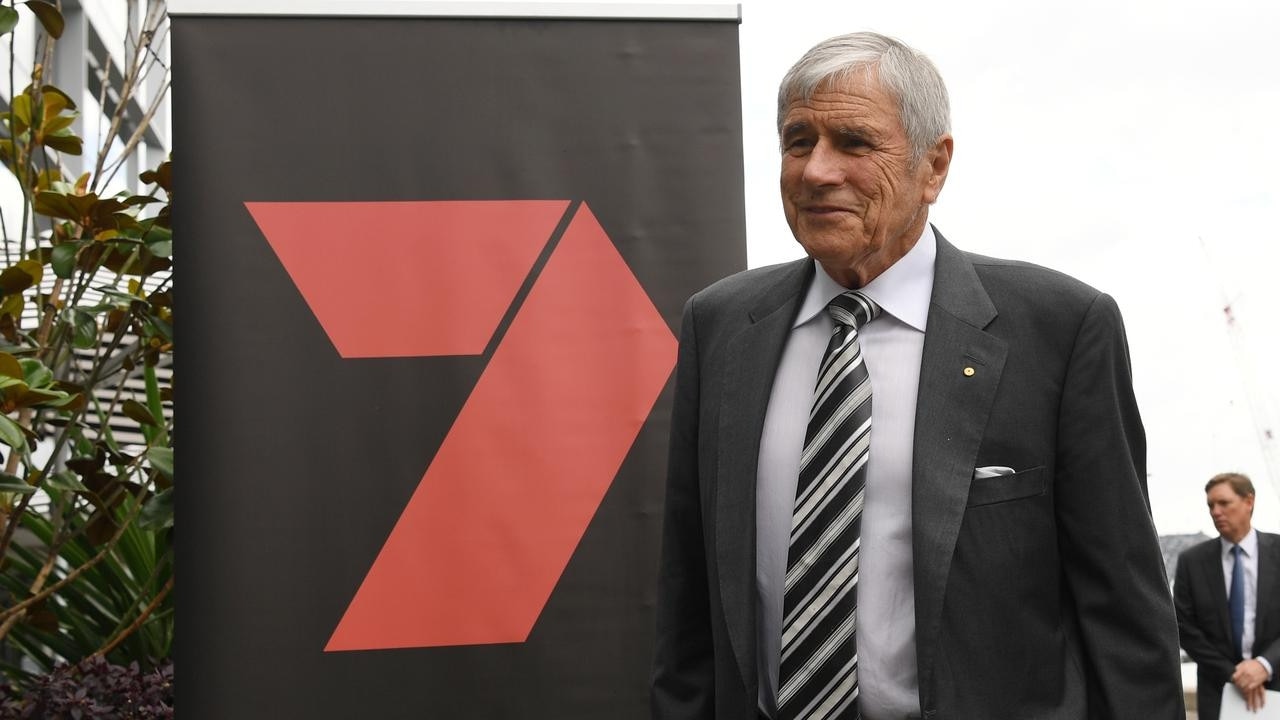Richard Boyer's anniversary one the ABC forgot
HISTORY is what we choose to remember.

HISTORY is what we choose to remember. This year, as the ABC engages in precious moments of cultural introspection to mark 50 years of Four Corners, another significant event in 1961 appears to have slipped its memory.
The anniversary of the death of the corporation's longest-serving chairman, Sir Richard Boyer, in June would have yielded a mini-series every bit as fascinating as Paper Giants. Yet it was Kerry and Frank Packer's street-wise genius, not the formative intellect of Australian public broadcasting, that inspired ABC drama commissioners this year.
A Boyer mini-series of sorts, the 52nd annual lecture series that bears his name, will be delivered in November by author Geraldine Brooks. An oblique salute to the Boyer era precedes ABC radio news bulletins. The confident bars of Charles Williams's Majestic Fanfarehave survived against the odds in an organisation that has little appetite for history or its lessons.
In April 1945, when prime minister John Curtin persuaded Boyer to become its chairman, the corporation was little more than a piecemeal collection of radio stations amalgamated on the cheap under a poorly framed act of parliament.
Charles Moses, in his first stint as general manager before the war, had begun the task of knocking the corporation into shape, but it was Boyer who was to provide its public purpose.
The Labor government's creeping abuse of wartime censorship provisions for partisan ends led Boyer to insist on a declaration of independence before he accepted the post. Curtin's written commitment to respect the ABC's "position of special independence of judgment and action" served as Boyer's mandate.
Boyer believed in the Reithian mission of public broadcasting, described by the BBC's founder John Reith as bring "to the greatest number of people as much as possible of contentment, of beauty, of wisdom".
Boyer's master's thesis at Sydney University, Erasmus: Apostle of the Modern Spirit, offered clues to his strong classical liberal values. He trained as a Methodist minister and served in World War I, but he was a humanist at heart, a modernist who believed man's varied needs could not be satisfied by a single dogma, and that reason was the best illumination for individuals and authorities.
Two visits to Europe on the eve of World War II gave Boyer a formative taste of radio's noble and ignoble potential. In Britain he was impressed by Reith's BBC, and its assumed responsibility to protect "the mental and moral state of the community". In Nazi Germany, by contrast, he felt the force of ultra-nationalism broadcast on Hitler's Volksempfangers - cheap radios installed in almost every home.
Fifteen years later, in a reply to academic claims of ABC timidity, Boyer declared that it would be "quite outrageous" for a body set up by parliament at public expense " to conduct campaigns for causes of its own choice".
"I should contest strongly any attempt, now or in the future, to use its facilities for the propagation of specific viewpoints on controversial or political issues," he wrote in The Institute of Public Administration's journal. "Surely the deplorable history of radio in the hands of totalitarian governments has established this principle sine qua non for democratic use."
Despite his appointment by a Labor prime minister, the view took hold in Labor circles that Boyer, a former advocate and spokesman for the wool industry, was Robert Menzies's henchman. Boyer's final act on behalf of the ABC was to protest in the strongest possible terms against an egregious act of interference in foreign programming by Menzies, yet Boyer would forever be associated with the baggage of the Menzies era.
Boyer defended the ABC's impartiality more fiercely and more intelligently than any of his successors, but to him independence was not a right to do as you pleased, but a responsibility to be exercised for the greater national good, and was to be interpreted by the ABC as an institution, not by its individual staff.
Boyer would not have welcomed the recent reinvention of the ABC as a "market-failure broadcaster". To him, the ABC occupied a space apart from commercial broadcasting, a mass broadcaster appealing to the community's higher instincts. Its appeal must be democratic, not elitist. Like education or arts funding, it was investment in the nation's cultural capital that demanded a return that was demonstrably for the public good. The ABC's task was not simply to keep out of trouble, but to build "an informed, critical and cultured democracy".
"Were we merely a body to provide music, entertainment and welfare services, we should have a comparatively happy and peaceful life," he told a lunch given by the Postmaster-General in June 1945.
"I think we all realise that, in the postwar years, we are entering a period in which grave and far-reaching issues of social and political policy will agitate the nation. It is our hope national broadcasting may stand solid and serene in the middle of our national life, running no campaign, seeking to persuade no opinion, but presenting the issues freely and fearlessly for the calm judgment of our people."
Boyer wanted the ABC to become "an impartial clearing house for ideas, a stimulant to thought, an instrument of education and aesthetic culture ... a much needed centre of national unity".
The abandonment of Boyer's Reithian ideals began two years after his death. A Four Corners report on the RSL, broadcast in August 1963, strangely omitted from the recent anniversary compendium, was a turning point, introducing a genre of partisan journalism that Boyer would have abhorred.
Four Corners editor Allan Ashbolt produced and presented a naked attack on the RSL, which had about 250,000 members and exercised some influence in the corridors of power. "In recent years it has become a powerful and controversial force in Australian politics, regarded by its admirers as a citadel of Australian nationalism, labelled by its critics as reactionary and militaristic," Ashbolt's commentary read.
Ashbolt, who trained as an actor, was a pioneer of the false-neutral voice. He feigns impartiality by weighing two arguments, but loads one side with semantic lead to tip the scales. The RSL is "controversial", slander is transferred "to its critics" and, later in the same program, "to some observers". In case we should think "a citadel of Australian nationalism" is a good thing, he goes on to quote from Kangaroo, the 1923 novel by D.H. Lawrence, who "sensed a jingoistic, super-patriotic, strain in some Australians and he thought it very dangerous".
Two weeks earlier, the National Civic Council had described the first edition of Four Corners under Ashbolt's editorship as "a triumph of one-sided reporting", alleging that the ABC was "fast losing any reputation for objectivity".
As outrage over the RSL episode took hold, Ashbolt had to step aside as Four Corners editor, but elsewhere - in the ABC's Talks Department - he continued his project of subverting everything Boyer stood for.
In the mini-series drama I have in mind tracing the postwar cultural drift at the ABC, Ashbolt would be Boyer's nemesis. Boyer's ABC aspired to serve "the great bulk of our people", while Ashbolt sowed the seeds of revolution among his own class, and was not afraid to say so.
In 1974, he wrote: "When I speak or write, perhaps it is mostly as a middleman of ideas, and to my own class, the middle class. The middle class is fallow soil for revolutionary ideas; it may even be able to function as what Marx rather unambiguously called the 'national class' - that social stratum which, at a certain phase in the historical progression towards true communism, is best equipped to stimulate political development and arouse political awareness."
Ashbolt, the crash-test dummy for ABC activism, was both maverick and mentor. His interpretation of independence, as a right exercised by individual broadcasters, rather than a responsibility borne by the institution, infuses contemporary ABC culture.
If Boyer had been watching television yesterday, I suspect he would have been alarmed by the ABC's Insiders and Network Ten's Bolt Report - not by what was said, but because it took two channels to say it. Boyer's open-minded ABC would have been big enough to accommodate both.
This article draws from G.C. Bolton's Dick Boyer: An Australian Humanist (1967) and K.S. Inglis's This Is The ABC (1983)



